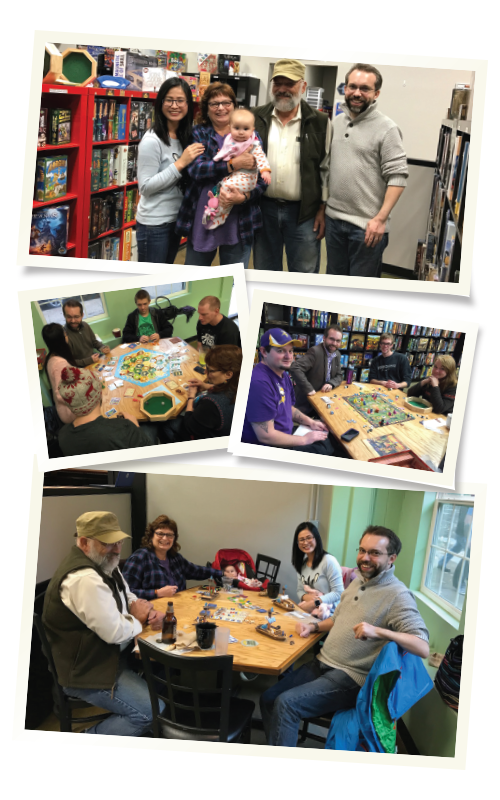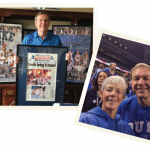On many Saturday evenings, Kaleb Michaud, PhD, saves the world from pandemics, harvests barrels of coffee beans to sell at market or helps King Brandur recover the fabled Runic DragonStones.
Dr. Michaud, an associate professor in the division of rheumatology and immunology at the University of Nebraska Medical Center (UNMC) in Omaha and also co-director of the National Data Bank for Rheumatic Diseases, is a faithful, fervent, full-fledged gamer. Forget video games. His passion is playing more than 2,000 board and card games that he says combine fun with social interaction and exercise various parts of a person’s brain.
Dr. Michaud doesn’t quite know when this hobby started. Perhaps it was after graduating from Stanford University (Palo Alto, Calif.) in 2006 with a doctorate in physics. He moved to Omaha the following year to serve on UNMC’s research and teaching staff. As a way to meet people, he joined a small group of board gamers who met every week for potluck dinner and games.
“I realized there was a whole world of games out there that I had never seen before and really enjoyed,” says Dr. Michaud, who for more than 15 years has also worked with Dr. Frederick Wolfe, the founder and director of the National Data Bank for Rheumatic Diseases and specialist in fibromyalgia and rheumatoid arthritis research. “I think that’s when my passion really grew.”
Fame, Pizza & Coffee

Top: Dr. Michaud (far right), his wife, baby and parents in the Spielbound Board Game Cafe.
Middle: Dr. Michaud (beard and glasses) acts as both teacher and student while playing games at Spielbound.
Above: Dr. Michaud (far right) plays a game with his wife and his parents, while his baby watches the action.
Over recent years, Dr. Michaud has purchased roughly 15 games every month. As he met more people, the size of the gaming group expanded to nearly 50 players. By 2012, he owned more than 1,000 different board games and hosted a monthly game night at his house for the next two years.
“Around 9 o’clock, we’d usually play a game of werewolf,” he says, explaining that it’s a party game involving trickery and deceit in which people are either villagers, defending their town, or werewolves wanting to devour the villagers. “It was our reset game that would take everyone away from their focused small group games in other rooms to see who all was here and [give us a chance to] learn something about [each other].”
That same year, one of the players called the local newspaper, The Omaha World Herald, to spread the word about their “magical” nights. The newspaper wrote a feature about it that went viral.
Several days later while working on a research paper late one Saturday night, Dr. Michaud received several text messages from friends, telling him that comedian Seth Myers on Saturday Night Live had just mentioned him.
“Seth said, ‘A man from Omaha, Nebraska, has over 1,500 board games. He’s mastered them all … except for the game of life,’” Dr. Michaud recalls. “It was pretty funny, especially because I have never won the board game called Life.”
In real life, however, Dr. Michaud was winning big. Besides realizing success in rheumatology research, he got married in 2014. Last year, the couple had a baby. But between a growing fan base and his new family, he could no longer sustain game night at his home.
The solution was to start a game library, actually open a cafe that’s a cross between Starbucks and Toys “R” Us. Dr. Michaud partnered with a friend to open a business, called Spielbound Board Game Cafe, on Sept. 2, 2014 (see Dr. Michaud talk about the business).
“We started with over 1,000 games and now have over 2,000 games in the library that people can pick from and play at their table,” he says, adding that no checkout system is needed.
Spielbound, which sells coffee, beer and pizza to help offset the cost of rent, supports approximately 15 staff, is open seven days a week and accommodates up to 125 players. On most evenings and—especially—weekends, Dr. Michaud says the place is usually packed and sometimes has a line of people trailing out the door.
Even when attending rheumatology conferences, Dr. Michaud carries a small card game in his pocket. “I show people how they can have fun in five minutes,” he says. “That sometimes makes a nice break from work.”
Lofty Goal
Besides serving as the city’s social spot for gamers, Spielbound has a higher purpose. Dr. Michaud and his partner split the cafe from the store’s gaming activity and turned the latter into a nonprofit.
“The act of playing games at a table with others is incredibly helpful for educating younger kids and also for preventing dementia and Alzheimer’s in adults,” says Dr. Michaud, who serves as the nonprofit’s director. “We spend all day long behind our computer or cell phone screens. Playing games requires people to use a completely different source of intellectual and emotional tools. Interacting with other humans around you, thinking about your next move and touching the game pieces use so many different parts of your brain.”
Part of the organization’s outreach efforts focus on seniors in the community, encouraging those in nearby retirement communities or assisted living facilities to routinely play games during the day at the cafe. But social media has been the nonprofit’s main form of advertising, so generating interest or excitement among seniors has been slow.
So far, Spielbound’s fundraising efforts have totaled $40,000. Roughly half was used to initially build or restore the game library. The other half supports four projects: encouraging teachers’ use of games in schools; Stay Sharp Seniors, which promotes the health benefits of game play in seniors; Everyone Plays, where volunteers teach the public a new game each day; and, SpielMasons, a group that creates and tests new games.
“I don’t think people should dismiss this as only a leisure-time activity,” Dr. Michaud says. “Everybody plays games on some level. In many ways, playing board games brings introverts and extroverts together in a way where they are all on even footing and can more easily get along—something we all could use more of these days.”
Carol Patton is a freelance writer based in Las Vegas.


